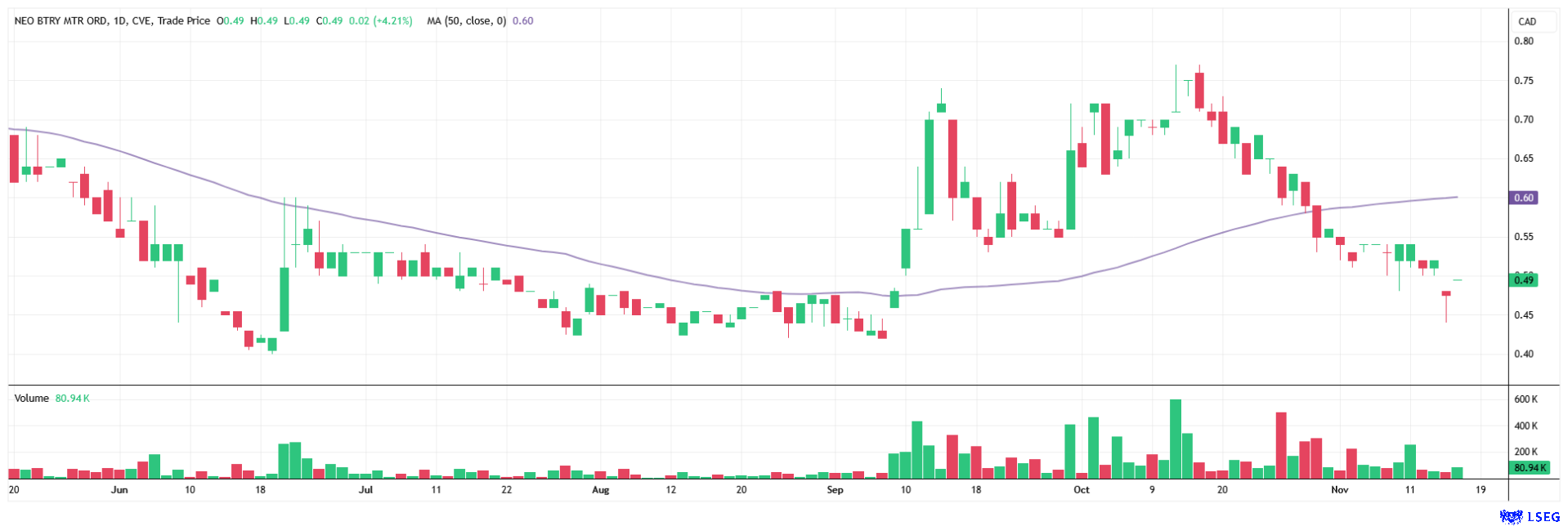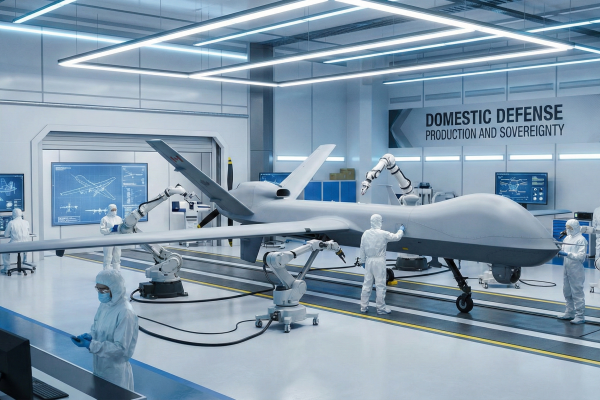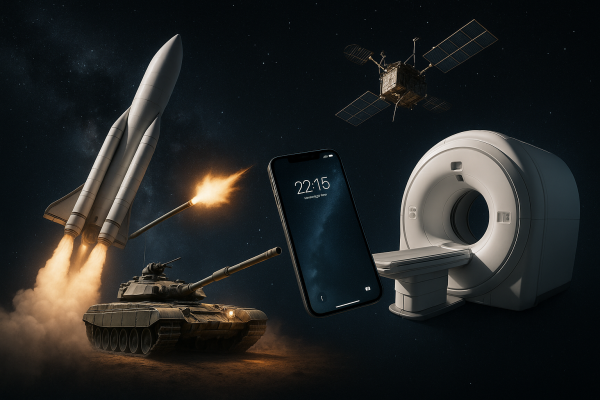November 19th, 2025 | 06:00 CET
New developments in drones – Is a growth spurt on the horizon? NEO Battery Materials, LG Chem, Albemarle
The war in Ukraine has triggered a boom in micro drones – and with it, a surge in demand for specialized battery technology. Ukrainian forces are increasingly relying on swarms of low-cost mini drones to counter larger unmanned combat aerial vehicles (UCAVs), such as Iranian Shahed drones. Several trends are emerging here for investors: demand for high-performance small drone batteries is soaring, while stable supply chains free of geopolitical risks are becoming more critical than ever. This is precisely where the up-and-coming company NEO Battery Materials comes into play.
time to read: 3 minutes
|
Author:
Nico Popp
ISIN:
NEO BATTERY MATERIALS LTD | CA62908A1003 , ALBEMARLE CORP. DL-_01 | US0126531013 , LG CHEM LTD | USY52758AF94
Table of contents:

"[...] Silumina Anodes® is a ceramic-coated graphite/silicon anode composite material that we plan to produce in Schwarze Pumpe, Saxony. Here, we aim to supply manufacturers of batteries for e-cars with an application-ready drop-in technology that is low-cost, high-performance and safe. [...]" Uwe Ahrens, Direktor, Altech Advanced Materials AG
Author
Nico Popp
At home in Southern Germany, the passionate stock exchange expert has been accompanying the capital markets for about twenty years. With a soft spot for smaller companies, he is constantly on the lookout for exciting investment stories.
Tag cloud
Shares cloud
Ukraine increasingly relies on interceptor drones – Supply chains gain importance
The drone war in Ukraine is brutal: Russia is flooding the country with more and more drones, which are significantly cheaper than missiles or cruise missiles. Ukraine is responding with cost-effective solutions such as small interceptor drones, costing only around USD 2,500 each. In comparison, a Shahed drone, now produced domestically by Russia, costs around USD 35,000. During recent waves of attacks, Ukraine has neutralized hundreds of enemy drones this way, without expending expensive air defense missiles. This example illustrates that the military drone market is rapidly expanding.
Analysts at Global Markets Insights expect the defense drone market to nearly double to over USD 21 billion by 2034. In addition to combat drones, interceptor drones are projected to be the fastest-growing segment. This boom is accompanied by a rethink of supply chains: in light of international tensions, militaries are increasingly calling for alliance-based supply chains that are independent of potential adversaries. For instance, the US has banned Chinese drone technology from its military arsenal and is actively promoting domestic alternatives. This trend favors innovative suppliers and creates high demand for reliable batteries and advanced battery materials. This is where Canadian company NEO Battery Materials comes in.
NEO Battery Materials makes drones better – First order received
NEO specializes in silicon anode materials for lithium-ion batteries. The Canadian company's business model aims to partially replace conventional graphite anodes with silicon, improving energy density and charging speed. Silicon theoretically stores ten times the capacity of graphite. With NBMSiDE®, NEO has developed a patented, cost-effective manufacturing process for its silicon anode material and expects this to open up great opportunities in the drone business, as well as other applications such as robotics.
In February 2025, NEO announced plans to build its first silicon anode factory in Canada. In early November, the Company received its second major order from the drone industry: a South Korean manufacturer of unmanned combat drones ordered CAD 3 million worth of anode material and signed a joint development agreement with NEO. Under the "David" project, NEO is developing complete battery systems for various types of drones – from swarm drones to VTOL models to balloon-based reconnaissance drones. Prototypes using NEO's silicon-reinforced cells are expected to demonstrate 25-50% longer flight times compared to today's lithium-polymer batteries and also achieve higher energy density. This performance boost translates into tactical advantages, as lighter batteries increase drone payload capacity. NEO aims to empower its customers’ electric drones to perform at a level comparable to larger, gasoline- or kerosene-powered systems, such as the Turkish Bayraktar TB2. At the same time, the Company is expanding its production base and plans to finalize the acquisition of an operational, revenue-generating facility in South Korea this month.

Resilient supply chains and unique technology – NEO Battery offers promising opportunities
The manufacture and development of battery materials across multiple continents is reminiscent of LG Chem's business model. The South Korean company primarily supplies the automotive industry and deliberately focuses on regional diversification – in addition to South Korea, the Company is also represented in China, the US, and Europe and considers itself resilient to tariffs or geopolitical shocks. The world's largest lithium producer, Albemarle, is also increasingly adding production sites outside South America to its portfolio to reduce dependencies and remain the preferred supplier for battery factories for the automotive industry in the future.
For NEO Battery Materials, the supply of raw materials is unlikely to play such a significant role – batteries for drones are small, and the Company scores primarily with its own patented silicon anode technology. **Company announcements in recent months show that NEO Battery is successfully advancing its commercialization. If the performance advantages that drones can achieve thanks to NEO's technology are confirmed, more customers from South Korea and beyond are likely to follow. NEO Battery Materials' share price has recently declined amid a minor market correction, offering an attractive entry point for all investors who believe in the growth of the drone market.
Conflict of interest
Pursuant to §85 of the German Securities Trading Act (WpHG), we point out that Apaton Finance GmbH as well as partners, authors or employees of Apaton Finance GmbH (hereinafter referred to as "Relevant Persons") may hold shares or other financial instruments of the aforementioned companies in the future or may bet on rising or falling prices and thus a conflict of interest may arise in the future. The Relevant Persons reserve the right to buy or sell shares or other financial instruments of the Company at any time (hereinafter each a "Transaction"). Transactions may, under certain circumstances, influence the respective price of the shares or other financial instruments of the Company.
In addition, Apaton Finance GmbH is active in the context of the preparation and publication of the reporting in paid contractual relationships.
For this reason, there is a concrete conflict of interest.
The above information on existing conflicts of interest applies to all types and forms of publication used by Apaton Finance GmbH for publications on companies.
Risk notice
Apaton Finance GmbH offers editors, agencies and companies the opportunity to publish commentaries, interviews, summaries, news and the like on news.financial. These contents are exclusively for the information of the readers and do not represent any call to action or recommendations, neither explicitly nor implicitly they are to be understood as an assurance of possible price developments. The contents do not replace individual expert investment advice and do not constitute an offer to sell the discussed share(s) or other financial instruments, nor an invitation to buy or sell such.
The content is expressly not a financial analysis, but a journalistic or advertising text. Readers or users who make investment decisions or carry out transactions on the basis of the information provided here do so entirely at their own risk. No contractual relationship is established between Apaton Finance GmbH and its readers or the users of its offers, as our information only refers to the company and not to the investment decision of the reader or user.
The acquisition of financial instruments involves high risks, which can lead to the total loss of the invested capital. The information published by Apaton Finance GmbH and its authors is based on careful research. Nevertheless, no liability is assumed for financial losses or a content-related guarantee for the topicality, correctness, appropriateness and completeness of the content provided here. Please also note our Terms of use.




